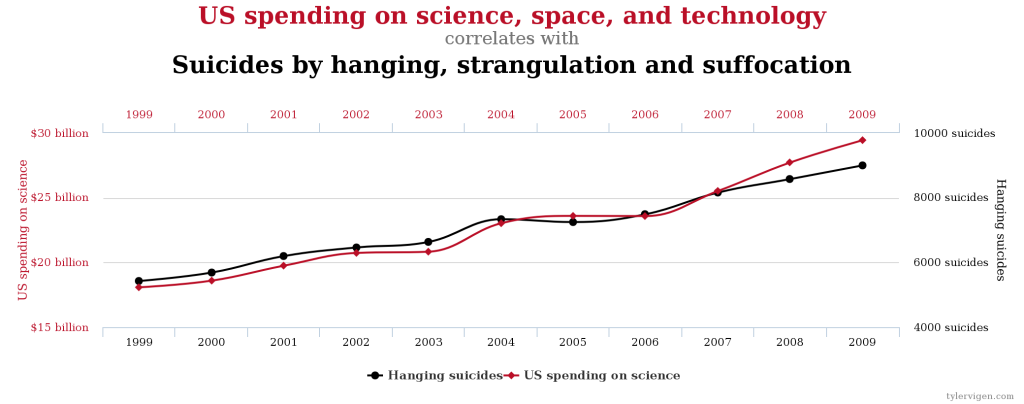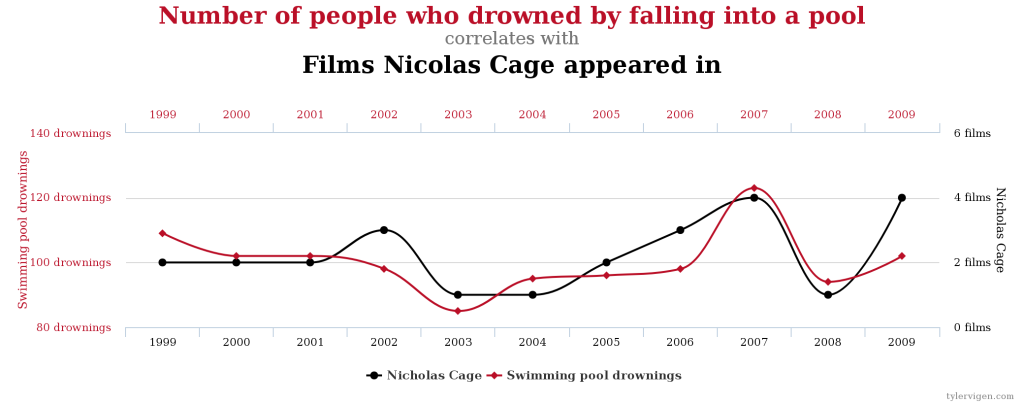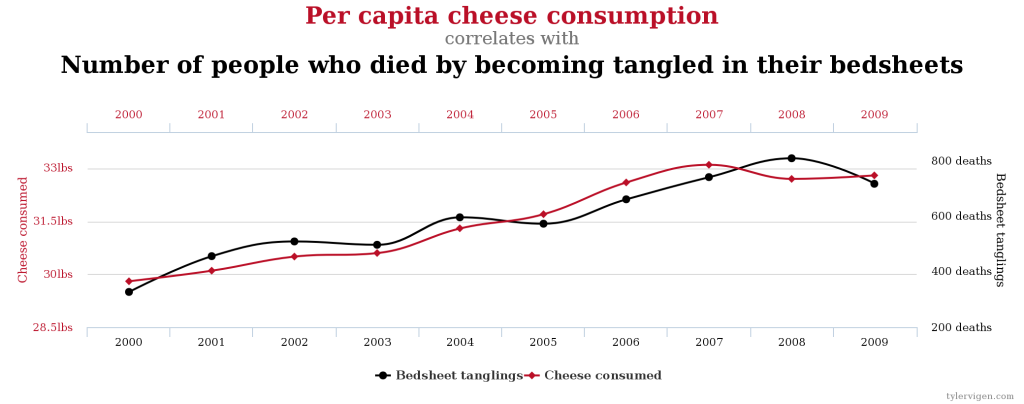We’re bombarded with information on a daily basis, but we don’t have many ways to validate or check the credibility of most of it.
More often than not, we just take it as fact. After all, the media wouldn’t lie to us would they? Of course this is a misnomer and false information is spread more often than it should be. One of the biggest culprits of such misinformation comes from statistics.
There are three kinds of lies – lies, damned lies, and statistics.Mark Twain
As has been repeated, although maybe not fully appreciated, you can make statistics prove anything to be true. There are many examples of such blatant misuse of statistics and one of the more common, yet dangerous uses, is the belief that correlation proves causation.
Let’s look at this one a little closer.
Correlation vs. Causation
The basic premise is that when a relationship is found between two variables, the next step is the assumption that one causes the other. Which is completely wrong.
This is what statisticians call a logical fallacy. It can be easy to fall into this trap and it has led to a number of hilarious outcomes. Like how spending on space is related to suicide rates or how Nicolas Cage films determines how many people drown in a pool every year.



In fact there’s an entire book related to these ridiculous correlations, which is quite entertaining.
One of my favorite examples has to be an editorial published in a newspaper that somehow determined that speaking English kills you:
It’s a relief to know the truth after all those conflicting medical studies. The Japanese eat very little fat and suffer heart attacks than the British or Americans.
The French eat a lot of fat and also suffer fewer heart attacks than the British or Americans.
The Japanese drink very little red wine and suffer fewer heart attacks than the British or Americans.
The Italians drink excessive amounts of red wine and also suffer fewer heart attacks than the British or Americans.
The Germans drink a lot of beer and eat lots of sausages and fats and suffer fewer heart attacks than the British or Americans.
Conclusion: Eat and drink what you like. Speaking English is apparently what kills you.
Although some of the misuse of statistics is harmless, others can be quite detrimental, like those that happen frequently in the field of nutrition. Suffice to say, there’s a ton of examples of correlation being passed off as causation. The truth is causation means it happens every single time and isn’t merely coincidence. Causation is much harder to prove than correlation, but why should you care?
Why It Matters
When claims are as ridiculous as those made above, it can be easy to discount any truth to their statements. On the other hand, some are so compelling that it’s hard not to fall into the trap. When someone claims that people who have more sex, make more money, you might just believe it.
While falling for some of these statements is harmless and only wastes your time, others can be downright harmful. The key is to do what you can to weed out the lies from those that are actually proven. There are three simple steps you can take to do exactly that and prevent yourself from falling down the rabbit hole.
1. Actually read the entire article
Far too often we skim an article or worse, just glance at a headline. It seems like a lot of the information we share with others comes from such cursory glimpses at articles, without truly understanding what the article is about and if it is even credible.
If you’re going to share information, at least take the time to consume it first.
2. Use common sense
Sure there are some surprising links that are hard to believe, for example some of the findings found in Freakonomics, but typically we have a good sense on what is real and what is fake. Use your common sense when you encounter a questionable claim.
Is the causation logically sound? What is the source of the material? Is the experiment that led them to their conclusion explained? Simple questions like these can help you quickly identify holes in an argument.
3. Find supporting evidence
Finally, if you come across some questionable claim of causation, the best thing to do would be to find supporting evidence before you take it as truth. This is as easy as a quick Google search, but doing so makes all the difference.
Finding additional sources, especially credible ones or the original research itself, goes a long way in proving out a causation.
______________
Dealing with correlation and causation can be tricky business and at times it’s downright confusing. Even so, it’s important to be aware of it’s presence and how it is being used. It’ll certainly make you a bit more suspicious, but it’s probably for the better. Right?
Even so, it’s important to be aware of it’s presence and how it is being used. It’ll certainly make you a bit more suspicious, but it’s probably for the better. Right?
Image via flickr
